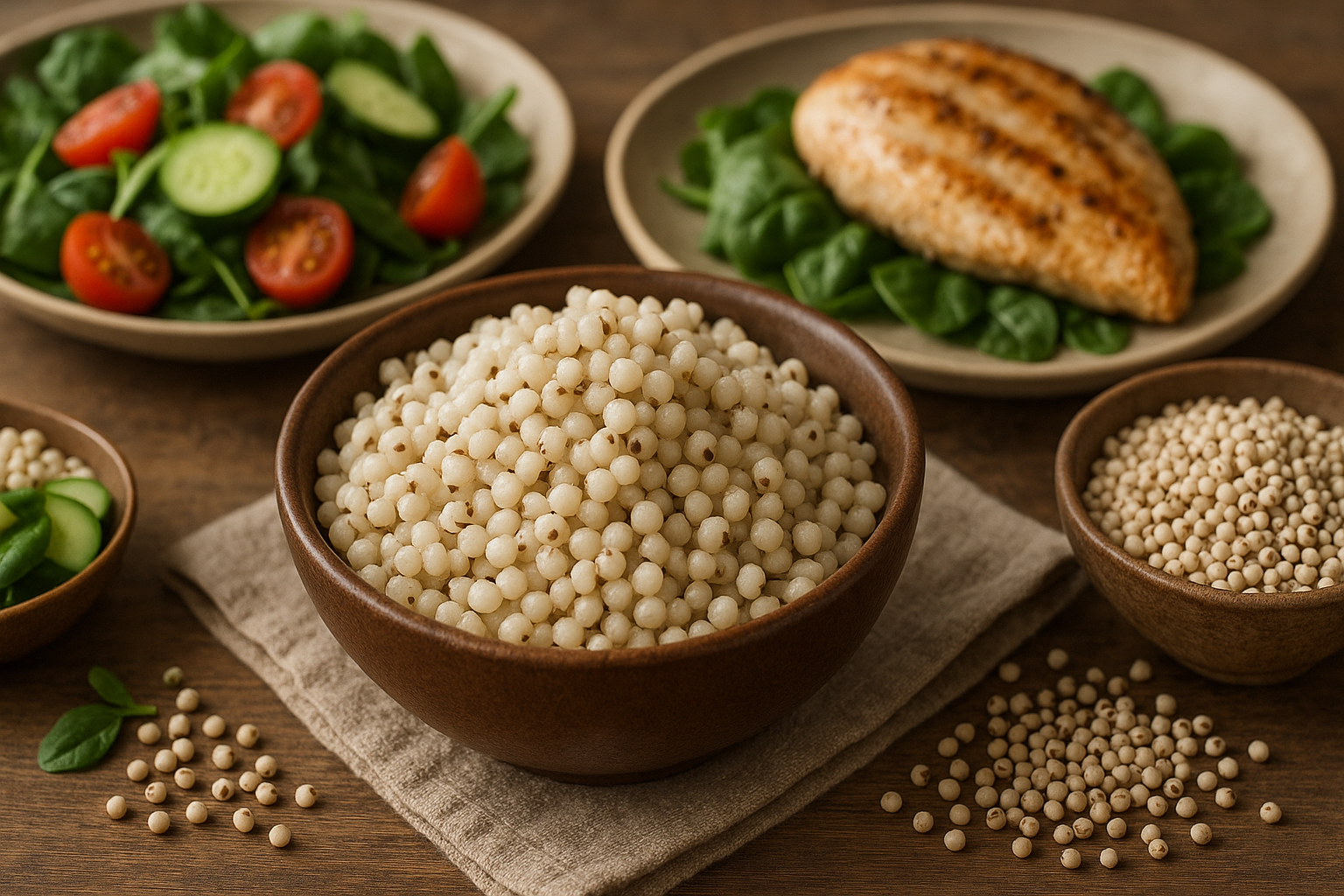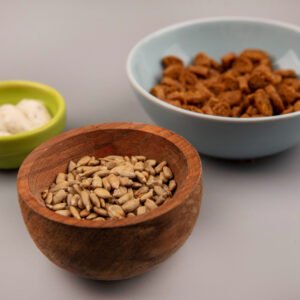White sorghum stands out as one of nature’s most nutritious grains, packed with protein, fiber, and antioxidants that can transform your daily meals. This ancient grain has sustained civilizations for thousands of years, and modern science confirms what traditional cultures have long known: white sorghum offers remarkable health benefits for contemporary lifestyles.
People seeking gluten-free alternatives or simply wanting to diversify their nutrition find white sorghum to be an excellent choice. Let’s explore why this versatile grain deserves a place in your kitchen.
What Makes White Sorghum Special
Sorghum, or the Indian millet, is also known as jowar. Rich in phenolic compounds, this grain provides complex carbs and is a perfect alternative to wheat. White sorghum specifically offers a mild flavor profile and light color that works well in various dishes.
Sorghum originated in Africa thousands of years ago, and then spread through the Middle East and Asia via ancient trade routes, traveling to the Arabian Peninsula, India and China along the Silk Road. This global journey speaks to its adaptability and nutritional value.
The grain contains impressive nutritional density. Here is why white sorghum stands apart from other grains:
- Protein Content: White sorghum provides substantial plant-based protein, making it an excellent choice for vegetarians and vegans.
- Fiber Benefits: The high fiber content supports digestive health and helps maintain stable blood sugar levels.
- Mineral Rich: Packed with essential minerals including iron, magnesium, and potassium.
- Antioxidant Properties: Contains beneficial compounds that support overall health.
Health Benefits of White Sorghum
Supports Digestive Health
Sorghum is rich in a variety of nutrients, including B vitamins, which play an essential role in metabolism, nerve cell development, and healthy hair and skin. The fiber content in white sorghum promotes healthy digestion and supports beneficial gut bacteria.
Regular consumption can help maintain digestive regularity and create a balanced gut microbiome. The whole grain nature of white sorghum provides prebiotics that feed beneficial bacteria in your digestive system.
Perfect for Gluten-Free Diets
A gluten-free grain, sorghum is rich in antioxidants, nutrients, protein and fiber. Sorghum is gluten-free, making it a suitable grain for people with celiac disease. White sorghum offers people with celiac disease or gluten sensitivity a safe and nutritious grain option.
Unlike many gluten-free alternatives that lack nutrients, white sorghum maintains high nutritional value. It can replace wheat in most recipes without compromising taste or texture.
Blood Sugar Management
The complex carbohydrates in white sorghum release energy slowly, preventing rapid blood sugar spikes. This makes it particularly beneficial for people managing diabetes or those wanting to maintain steady energy levels throughout the day.
The fiber content helps slow glucose absorption, supporting better blood sugar control when white sorghum replaces refined grains in meals.
Heart Health Support
It’s also a rich source of magnesium, a mineral that’s important for bone formation, heart health, and over 600 biochemical reactions. Magnesium supports cardiovascular function and helps regulate blood pressure.
The antioxidants in white sorghum may help reduce inflammation, which is linked to heart disease. Regular consumption as part of a balanced diet can contribute to better cardiovascular health.
Cancer-Fighting Properties
Compounds in sorghum called 3-Deoxyanthoxyanins (3-DXA) are present in darker-colored sorgums, and to a lesser extent in white sorghum. Scientists at the University of Missouri tested extracts of black, red, and white sorghums and found that all three extracts had strong antiproliferative activity against human colon cancer cells.
While white sorghum contains fewer of these compounds than darker varieties, it still provides beneficial antioxidants that may help protect against cellular damage.
Nutritional Profile of White Sorghum
White sorghum delivers impressive nutritional value per serving. Here’s what makes it nutritionally dense:
Macronutrients:
- High-quality protein (approximately 11 grams per cup)
- Complex carbohydrates for sustained energy
- Minimal fat content
Micronutrients:
- B vitamins for energy metabolism
- Iron for oxygen transport
- Magnesium for muscle and nerve function
- Phosphorus for bone health
- Potassium for heart function
Research suggests that sorghum contains essential nutrients, including B vitamins, iron, magnesium, and potassium. It is also a good source of protein, offering a plant-based alternative for those seeking to diversify their protein intake.
Find out whether green millet or red millet is the better choice for effective and healthy weight loss.
How to Include White Sorghum in Your Meals
Breakfast Options
Start your day with white sorghum porridge topped with fresh fruits and nuts. Cook it similar to oatmeal, but allow extra time for the grains to soften completely.
White sorghum flour works wonderfully in pancakes, muffins, and breakfast breads. Its mild flavor won’t overpower other ingredients.
Lunch and Dinner Ideas
Our white sorghum can be popped like popcorn or used in pilafs, salads and anywhere else whole grains are called for. Try these preparation methods:
- Grain Bowls: Use cooked white sorghum as a base for Buddha bowls with roasted vegetables and lean proteins.
- Salads: Add cooled, cooked white sorghum to green salads for extra texture and nutrition.
- Pilafs: Replace rice in pilaf recipes with white sorghum for a nuttier flavor and better nutrition.
- Soups and Stews: White sorghum adds heartiness to vegetable soups and meat stews.
Baking Applications
White sorghum flour is a versatile, gluten-free flour made from finely ground white sorghum grain. It has a light color, mild flavor, and smooth texture, making it an excellent alternative to traditional wheat flour in a variety of culinary applications.
White sorghum flour can replace up to 25% of regular flour in most recipes without major adjustments. For completely gluten-free baking, combine it with other gluten-free flours for best results.
Cooking Tips for White Sorghum
Preparation Time: White sorghum takes longer to cook than most grains. Plan for 45-60 minutes of cooking time.
Soaking Benefits: Soaking white sorghum overnight reduces cooking time and improves digestibility.
Liquid Ratios: Use a 3:1 ratio of liquid to grain for proper cooking.
Flavor Pairings: White sorghum pairs well with herbs like thyme and rosemary, and complements both sweet and savory dishes.
Storage: Store cooked white sorghum in the refrigerator for up to one week or freeze for longer storage.
Environmental Benefits of Choosing White Sorghum
White sorghum grows well in challenging climates and requires less water than many other grains. This drought tolerance makes it an environmentally sustainable choice that supports agricultural diversity.
The grain grows efficiently without extensive irrigation, making it a climate-smart crop that can help address food security challenges while requiring fewer natural resources.
How CMS Industries Supports Your Healthy Choices
CMS Industries recognizes the growing demand for nutritious, sustainable grain options like white sorghum. As a leading agricultural products manufacturer and supplier in India, CMS Industries has been connecting farmers and consumers with high-quality grains for over two decades.
Based in Kachchh, Gujarat, CMS Industries specializes in ethically sourced agricultural products that meet international quality standards. The company’s commitment to supporting farmers while delivering premium products aligns perfectly with the growing interest in ancient grains like white sorghum.
CMS Industries’ expertise in agricultural products means they understand the importance of proper handling and processing to maintain the nutritional benefits of grains like white sorghum. Their established distribution network helps ensure that quality grains reach consumers who are making healthier food choices.
The company’s focus on organic and sustainable farming practices supports the production of grains that retain their natural nutritional profiles. This commitment to quality makes CMS Industries a reliable partner for those seeking to incorporate nutritious grains into their diets.
Making the Switch to White Sorghum
Transitioning to white sorghum doesn’t require dramatic changes to your cooking routine. Start by substituting it for rice in one meal per week, then gradually increase usage as you become comfortable with cooking techniques.
Experiment with white sorghum flour in familiar recipes like muffins or pancakes. The mild flavor makes it an easy introduction to gluten-free baking.
Consider batch cooking white sorghum on weekends to have it ready for quick meals throughout the week. This preparation strategy makes healthy eating more convenient.
Storage and Selection Tips
When purchasing white sorghum, look for grains that appear uniform in color and size. Avoid packages with broken grains or signs of moisture damage.
Store white sorghum in airtight containers in a cool, dry place. Properly stored whole grains can maintain quality for up to two years.
White sorghum flour should be stored in the refrigerator or freezer to prevent rancidity, especially in warm climates.
White sorghum represents a smart choice for anyone looking to improve their nutrition while enjoying diverse, flavorful meals. Its combination of protein, fiber, and essential nutrients makes it a valuable addition to modern diets.
Ready to explore the benefits of white sorghum and other premium agricultural products? Connect with CMS Industries to learn more about sourcing high-quality grains that support your healthy lifestyle and culinary adventures.
Frequently Asked Questions
Is white sorghum safe for people with celiac disease?
Yes, white sorghum is naturally gluten-free and safe for people with celiac disease or gluten sensitivity. It provides a nutritious alternative to wheat-based products.
How does white sorghum compare to quinoa nutritionally?
White sorghum contains similar protein levels to quinoa but offers more fiber and different mineral profiles. Both are excellent gluten-free grain choices with unique nutritional benefits.
Can I substitute white sorghum flour directly for wheat flour?
White sorghum flour works best when replacing up to 25% of wheat flour in recipes. For completely gluten-free baking, combine it with other gluten-free flours and binding agents.
How long does white sorghum take to cook?
Whole white sorghum grains typically require 45-60 minutes of cooking time. Soaking overnight can reduce cooking time by 10-15 minutes.
What does white sorghum taste like?
White sorghum has a mild, slightly nutty flavor that’s less pronounced than other ancient grains. Its neutral taste makes it versatile for both sweet and savory applications.





